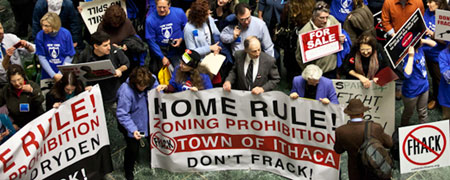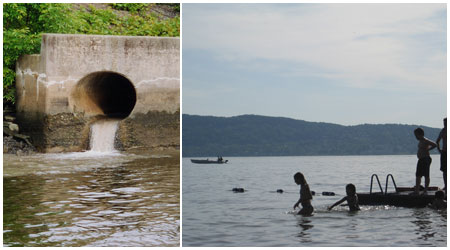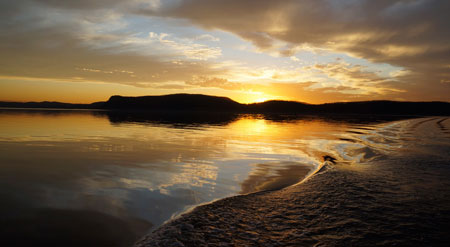|
|
| Fracking Day of Action courtesy Jessica Riehl |
Don't Frack with NY Towns!
In two separate cases, state judges affirmed towns’ rights to restrict gas drilling within their borders. While these victories are sure to be appealed to higher levels, these two initial wins could prove pivotal, as Gov. Andrew Cuomo and the Department of Environmental Conservation have said they could finalize their fracking proposal this spring, despite the record-setting 60,000 public comments in response to New York’s flawed draft.
· Take Action! With two clicks, you can use Riverkeeper’s online action center to tell your state representatives to Stop the Rush to Frack and to close a loophole that now exempts frackers from treating their hazardous waste like other industries.
· Get Informed: Read about first-ever state rules governing the large-scale withdrawal of water for purposes including fracking, and Riverkeeper’s concerns.
· Donate: Support our Don’t Frack with New York campaign with a donation to Riverkeeper’s Watershed Program.
|
|
Fighting for Safer Swimming
Riverkeeper has documented many instances when water quality fails to meet Environmental Protection Agency standards for safe swimming. That’s why we’re fighting back against an EPA proposal that would lower the bar on water quality standards and public health protection. We are calling for monitoring and reporting that will more accurately represent water quality conditions and support actions to stop sewage pollution. Riverkeeper is also urging Brooklyn and Queens residents to demand that long-term plans for sewage overflows in Newtown Creek set a higher bar for water quality.
· Take Action! Sign our petition in support of a Sewage Right to Know Law.
· Get Informed: Check the water quality data for your location, and read about our efforts to build a volunteer team to test the Hudson’s largest tributary.
· Donate: Ensure testing continues with a gift to Riverkeeper’s Water Quality Program.
|
|
Intervening to Protect Vital Hudson Habitat
Transmission Developers, Inc. (TDI) is seeking permits to build the Champlain Hudson Power Express, a 1,000-megawatt electric transmission line that would deliver power to New York City, in part with a submarine cable in the Hudson River. Together with its partners, Riverkeeper agreed to a settlement, negotiated over 15 months, with TDI that would:
· protect critical Hudson habitats, including between Albany and Catskill, and in Haverstraw Bay (pictured), by removing the cable from a third of the river;
· require testing before and after construction to ensure river life isn’t affected; and,
· create a $117 million fund, administered by a third party, that will pay for habitat studies, restoration and other priority projects identified by New York and environmental groups, including Riverkeeper.
Riverkeeper in the Press
02.24.12 :: DiscoveryNews
Small Town Gets Court to Ban Fracking
The town of Dryden, N.Y., recently won a court ruling saying it could prohibit fracking as part of its zoning ordinance. Environmental groups called the ruling a victory for residents while drilling proponents are unsure the ruling will mean that other towns can put a halt to fracking. Kate Hudson, Riverkeeper’s Watershed Program Director, said, “A number of towns were waiting to see how the litigation gets settled, but nobody thinks it is the end.”
02.22.12 :: Capital
What can Andrew Cuomo actually do about Indian Point?
On the federal level, in 2010 and 2011, Entergy spent around $8.2 million on lobbyists. “They have enormous legal resources at their disposal… their lawyers outnumber us sometimes three to one.” Phillip Musegaas, Riverkeeper’s Hudson River Program Director.
02.22.12 :: The Daily Tarrytown
Concerns Arise About GM Clean-Up in Sleepy Hollow
Phillip Musegaas said Riverkeeper was still reviewing the documents on the proposed remediation, but that it is “very skeptical” that capping over the site will prevent further contamination, because the polluted soil will still interact with groundwater and will continue "leaching contaminants into the Hudson River."



No comments:
Post a Comment